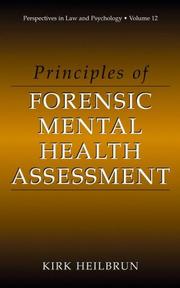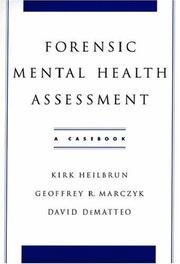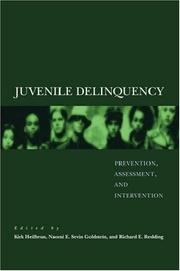| Listing 1 - 10 of 10 |
Sort by
|

ISBN: 0306473828 0306465388 Year: 2001 Publisher: New York : Kluwer Academic/Plenum Publishers,
Abstract | Keywords | Export | Availability | Bookmark
 Loading...
Loading...Choose an application
- Reference Manager
- EndNote
- RefWorks (Direct export to RefWorks)
Most of the literature in forensic mental health assessment is organized around the particular legal issue that is the focus of a given assessment, tool, or research study. This book starts with a different assumption: There are broad principles of forensic assessment that are applicable across different legal issues. If such principles exist, they should be derived from and supported by sources of authority in ethics, law, science, and prof- sional practice. This is what I seek to do in this book, with each of the 29 broad principles of forensic mental health assessment described and a- lyzed from the perspective of these sources of authority. There are a number of individuals who have contributed in various ways to making this a better book. It seems best to begin with a general acknowledgment: Those interested in forensic mental health assessment, particularly my colleagues from the American Psychology–Law Society and the American Board of Forensic Psychology, have been an extraor- narily helpful and congenial group. I have learned a great deal from them over the years and they challenged me to undertake the daunting task of trying to capture the broad views of the field in this book.
Evidence, Expert. --- Forensic psychology. --- Mental illness -- Diagnosis. --- Forensic psychology --- Mental illness --- Evidence, Expert --- Expert Testimony --- Forensic Psychiatry --- Personality Assessment --- Psychiatry --- Jurisprudence --- Behavioral Disciplines and Activities --- Forensic Medicine --- Psychiatry and Psychology --- Medicine --- Social Control, Formal --- Forensic Sciences --- Behavioral Sciences --- Health Care Economics and Organizations --- Sociology --- Criminology --- Health Occupations --- Health Care --- Disciplines and Occupations --- Social Sciences --- Anthropology, Education, Sociology and Social Phenomena --- Legal & Forensic Medicine --- Public Health --- Health & Biological Sciences --- Diagnosis --- Diagnosis. --- Psychology. --- Psychiatry. --- Clinical psychology. --- Law and Psychology. --- Clinical Psychology. --- Criminology and Criminal Justice, general. --- Psychiatric diagnosis --- Juridical psychology --- Juristic psychology --- Legal psychology --- Psychology, Forensic --- Expert evidence --- Expert testimony --- Expert witness --- Expert witnesses --- Opinion evidence --- Scientific evidence (Law) --- Law --- Psychology, clinical. --- Criminology. --- Psychological aspects. --- Psychodiagnostics --- Forensic sciences --- Psychology, Applied --- Evidence (Law) --- Witnesses --- Crime --- Social sciences --- Criminals --- Medicine and psychology --- Mental health --- Psychology, Pathological --- Psychological tests --- Behavioral sciences --- Mental philosophy --- Mind --- Science, Mental --- Human biology --- Philosophy --- Soul --- Study and teaching
Book
ISBN: 0190230177 1282126024 0199708665 9780199708666 9780195369816 0195369815 Year: 2009 Publisher: New York : Oxford University Press,
Abstract | Keywords | Export | Availability | Bookmark
 Loading...
Loading...Choose an application
- Reference Manager
- EndNote
- RefWorks (Direct export to RefWorks)
Forensic mental health assessment (FMHA) has grown into a specialization informed by research and professional guidelines. This series presents up-to-date information on the most important and frequently conducted forms of FMHA. The 19 topical volumes address best approaches to practice for particular types of evaluation in the criminal, civil, and juvenile/family areas. Each volume contains a thorough discussion of the relevant legal and psychological concepts, followed by a step-by-step description of the assessment process from preparing for the evaluation to writing the report and testifyi
Violence --- Dangerously mentally ill --- Forensic psychology. --- Juridical psychology --- Juristic psychology --- Legal psychology --- Psychology, Forensic --- Forensic sciences --- Psychology, Applied --- Dangerous mental patients --- Insane, Criminal and dangerous --- Mentally ill --- Violent behavior --- Social psychology --- Risk assessment.

ISBN: 9780306465383 Year: 2001 Publisher: New York (N.Y.) Kluwer Academic/Plenum
Abstract | Keywords | Export | Availability | Bookmark
 Loading...
Loading...Choose an application
- Reference Manager
- EndNote
- RefWorks (Direct export to RefWorks)

ISBN: 1280531916 9786610531912 0198033311 0195302915 9780195302912 9780198033318 9780195145687 0195145682 9781280531910 Year: 2002 Publisher: Oxford ; New York : Oxford University Press,
Abstract | Keywords | Export | Availability | Bookmark
 Loading...
Loading...Choose an application
- Reference Manager
- EndNote
- RefWorks (Direct export to RefWorks)
Forensic mental health assessments are evaluations conducted by individuals from different disciplines on a variety of questions in civil, criminal, and family law. A growing number of mental health professionals, including psychologists, psychiatrists, and social workers, are being called upon to assess everything from an individual's competence to stand trial to the risk or threat of future violence, and asked to weigh in on cases ranging from murder and assault to malpractice and child custody."" General principles have emerged to guide professionals conducting forensic mental health assess
Forensic psychology --- Mentally ill offenders --- Forensic psychiatry --- Medical jurisprudence --- Psychiatry --- Insane, Criminal and dangerous --- Mentally ill criminals --- Offenders, Mentally ill --- Criminals --- Juridical psychology --- Juristic psychology --- Legal psychology --- Psychology, Forensic --- Forensic sciences --- Psychology, Applied --- Law and legislation
Book
ISBN: 0199886598 019023024X 1282564064 9786612564062 0199724156 9780199724154 9780195323092 9781282564060 6612564067 9780199886593 Year: 2009 Publisher: New York : Oxford University Press,
Abstract | Keywords | Export | Availability | Bookmark
 Loading...
Loading...Choose an application
- Reference Manager
- EndNote
- RefWorks (Direct export to RefWorks)
Forensic mental health assessment (FMHA) has grown into a specialization informed by research and professional guidelines. This series presents up-to-date information on the most important and frequently conducted forms of FMHA. The 19 topical volumes address best approaches to practice for particular types of evaluation in the criminal, civil, and juvenile/family areas. Each volume contains a thorough discussion of the relevant legal and psychological concepts, followed by a step-by-step description of the assessment process from preparing for the evaluation to writing the report and testifyi

ISBN: 019516007X Year: 2005 Publisher: New York, NY : Oxford University Press,
Abstract | Keywords | Export | Availability | Bookmark
 Loading...
Loading...Choose an application
- Reference Manager
- EndNote
- RefWorks (Direct export to RefWorks)
Juvenile corrections --- Juvenile delinquency --- Sociale agogiek --- Prevention. --- jeugdbescherming en kinderrechten. --- Prevention --- Adolescent --- Délinquance juvénile --- Évaluation --- Trouble de la personnalité de type antisocial --- Ecole --- Institution pour enfants et adolescents --- Intervention --- Traitement --- Trouble psychopathologique --- Violence --- Juvenile delinquency.

ISBN: 0190261730 1280704098 0198036280 1429421355 9780198036289 019516007X 9780195160079 Year: 2005 Publisher: New York : Oxford university Press,
Abstract | Keywords | Export | Availability | Bookmark
 Loading...
Loading...Choose an application
- Reference Manager
- EndNote
- RefWorks (Direct export to RefWorks)
1. Introduction, Richard E. Redding, Naomi E. Sevin Goldstein, and Kirk Heilbrun. 2. Risk Factors, Protective Factors, and the Prevention of Antisocial Behavior Among Juveniles, David DeMatteo and Geoffrey Marczyk. 3. School Violence: Fears Versus Facts,, Dewey G. Cornell. 4. Juvenile Offending, Barry Krisberg and Angela M. Wolf. 5. Mental Health Disorders: The Neglected Risk Factor in Juvenile Delinquency, Naomi E. Sevin Goldstein, Oluseyi Olubadewo, Richard E. Redding, and Fran Lexcen. 6. Risk Factors and Intervention Outcomes: Meta-Analyses of Juvenile Offending, Kirk Heilbrun, Ria Lee, and
Juvenile delinquency --- Juvenile corrections --- Prevention.
Book
ISBN: 0190261676 0199941564 9780199941568 9781306582391 1306582393 9780199941551 0199941556 9780190261672 0190454318 Year: 2014 Publisher: Oxford New York
Abstract | Keywords | Export | Availability | Bookmark
 Loading...
Loading...Choose an application
- Reference Manager
- EndNote
- RefWorks (Direct export to RefWorks)
Forensic mental health assessment (FMHA) continues to develop and expand as a specialization. Since the publication of the First Edition of Forensic Mental Health Assessment: A Casebook over a decade ago, there have been a number of significant changes in the applicable law, ethics, science, and practice that have shaped the conceptual and empirical underpinnings of FMHA. The Second Edition of Forensic Mental Health Assessment is thoroughly updated in light of the developments and changes in the field, while still keeping the unique structure of presenting cases, detailed reports, and specific
Forensic psychology --- Mentally ill offenders --- Forensic psychiatry --- Medical jurisprudence --- Psychiatry --- Insane, Criminal and dangerous --- Mentally ill criminals --- Offenders, Mentally ill --- Criminals --- Juridical psychology --- Juristic psychology --- Legal psychology --- Psychology, Forensic --- Forensic sciences --- Psychology, Applied --- Law and legislation --- Expert Testimony --- Mental Competency --- Personality Assessment --- Forensic Psychiatry --- Expert Opinion --- Expert Witness --- Expert Opinions --- Expert Testimonies --- Expert Witnesses --- Opinion, Expert --- Testimony, Expert --- Witness, Expert --- Witnesses, Expert --- Assessment, Personality --- Assessments, Personality --- Personality Assessments --- Competence --- Incompetence, Mental --- Mental Competence --- Competency, Mental --- Incompetency, Mental --- Competence, Mental --- Mental Incompetence --- Mental Incompetency --- Informed Consent --- Insanity Defense --- Treatment Refusal --- Comprehension --- methods --- United States
Book
ISBN: 9781433819674 1433819678 Year: 2016 Publisher: Washington, DC American Psychological Association
Abstract | Keywords | Export | Availability | Bookmark
 Loading...
Loading...Choose an application
- Reference Manager
- EndNote
- RefWorks (Direct export to RefWorks)
Juvenile delinquency --- Forensic psychology --- Juvenile justice, Administration of --- Juvenile delinquents --- Criminal psychology --- Psychological aspects --- Mental health
Book
Year: 2016 Publisher: [Washington, DC] : American Psychological Association
Abstract | Keywords | Export | Availability | Bookmark
 Loading...
Loading...Choose an application
- Reference Manager
- EndNote
- RefWorks (Direct export to RefWorks)
"The APA Handbook of Psychology and Juvenile Justice consolidates and advances knowledge about the legal, scientific, and applied foundations of the juvenile justice system. In addition to an overview of the area, it contains chapters in the following sections: Relevant Law (focusing on important legislation and on U.S. Supreme Court decisions from Kent and Gault to Eddings, Roper, Graham, and Miller-Jackson, and on the relevant legal theory of preventive justice for adolescents); Human Development (describing research on adolescent development and brain development as they apply to behavior in the juvenile justice context); Patterns of Offending (including evidence about offending in juveniles and the persistence vs. desistance into adulthood); Risk Factors for Offending (evidence about risk factors for juvenile offending including Risk-Need-Responsivity theory, juvenile psychopathy, substance abuse, gangs, and trauma/adverse experience, as well as threat assessment and bullying prevention in schools); Forensic Assessment (assessing risk, needs/amenability, and sophistication-maturity as part of legal decisions on commitment, transfer, and reverse transfer, as well as legal decisions on Miranda waiver capacity and competence to stand trial); Interventions (evidence on risk-reducing interventions, both in the community and in residential placement, including for specialized offending of sexual offenders) and; Training and Ethics (including the updated MacArthur curriculum on adolescents in the juvenile justice system and an analysis of the ethical issues particular to juvenile justice)"--Publicity materials. (PsycINFO Database Record (c) 2015 APA, all rights reserved).
Juvenile delinquency --- Forensic psychology --- Juvenile justice, Administration of --- Juvenile delinquents --- Criminal psychology --- Psychological aspects --- Mental health
| Listing 1 - 10 of 10 |
Sort by
|

 Search
Search Feedback
Feedback About UniCat
About UniCat  Help
Help News
News